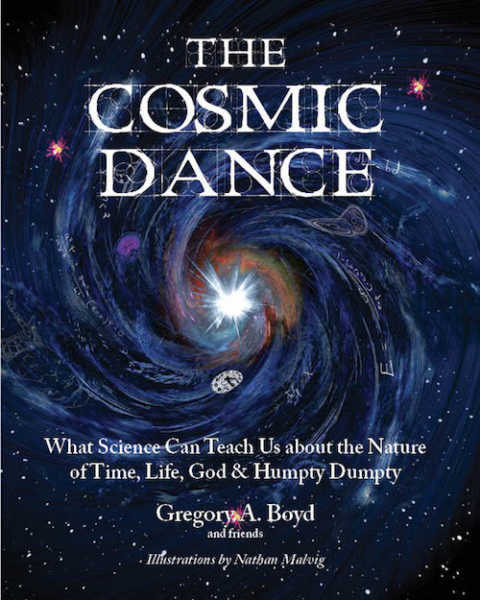We run our website the way we wished the whole internet worked: we provide high quality original content with no ads. We are funded solely by your direct support. Please consider supporting this project.

Roger Olson’s Review of The Cosmic Dance
Today we wanted to share a review of The Cosmic Dance by esteemed theologian Roger Olson. You can check out an excerpt below or you can read the whole review here. You can place an order for The Cosmic Dance here.
The Cosmic Dance is Greg’s (and friends’) attempt to present the case that the best contemporary science supports viewing time as an “arrow” such that an omnipresent being (such as the God of traditional Christianity) would not “already be” in the future or “still be” in the past but would experience the future as not yet and the past as no longer available. In other words, the book argues, using numerous quotations from and references to modern and contemporary physics, that relativity theory, as understood through post-Einsteinian physics, supports an “open view” of the universe and the future in which real novelty and spontaneity characterize events within an overall interconnected whole of reality.
When I read a book I often try to find a key paragraph that sums up its main “big idea” or single most important thesis. Here is my candidate for that in The Cosmic Dance: “In this book we’ve argued that Quantum Theory, Chaos-Complexity Theory and Non-equilibrium Thermodynamics suggest that a fully deterministic description of the world is impossible, and that time and novelty are more than mere illusions. We’ve argued that even Relativity Theory gives a role to time that is very different from space. This all suggests that reality moves from a settled past into a partly open future.” (184) …
I can heartily recommend this book for the pictures if nothing else! Seriously, however, if you are interested in reading a case made from science that time is “for real” and not illusory, and that although time and space are, indeed, inter-related that does not mean an omnipresent being must somehow already be “in the future,” buy the book.
Category: General
Tags: Open Theism, Roger Olson, The Cosmic Dance
Related Reading

Molinism and Open Theism – Part I
I’ve been asked for the umpteenth time on Twitter lately about the difference between “Molinism” and “Open Theism,” and for some reason, today seemed like a good day to begin addressing this question. I’ll do this in two parts. Today I’ll outline and critique Molinism, and in a subsequent post I’ll raise yet another critique as…

8346
Umberto Salvagnin via Compfight Oh oh. It’s getting ugly up in here. Frank Viola is suggesting that Greg needs to fix a nice tall glass of shut-up juice. He and Greg have decided to have a debate on the open view sometime this fall, and they have been engaging in some smack talk since that decision…

What is the significance of 2 Chronicles 32:31?
“God left [Hezekiah] to himself, in order to test him and to know all that was in his heart.” God tests his covenant partners to discover whether they will choose to remain faithful to him, an exercise that is absurd if God exhaustively foreknows exactly how faithful every person will choose to be. If the…

What is the significance of Deuteronomy 9:13–14, 18–20, 25?
The Lord tells Moses “Let me alone that I may destroy them [the Israelites] and blot out their name from under heaven…” (vs. 14). Moses later says to the Israelites, “the Lord intended to destroy you” (vs. 25). Moses interceded for forty days and then tells the Israelites, “the Lord listened to me…” (vs. 19).…

Neo-Molinism and the Infinite Intelligence of God
Classical Molinism holds that, since God is omniscient and knows all truths, he knows not only what every agent will do in the future, but also what every agent would have done in every other “possible world.” In this essay I argue that classical Molinism overlooked a whole category of truths that an omniscient God…

Paradigm Shift Questions
A couple that was recently introduced to ReKnew and several of my books recently wrote to tell me that they are in the process of embracing the warfare worldview along with the open view of the future. They said that they “realize that these things aren’t minor adjustments but are rather all-encompassing paradigm shifts in…
